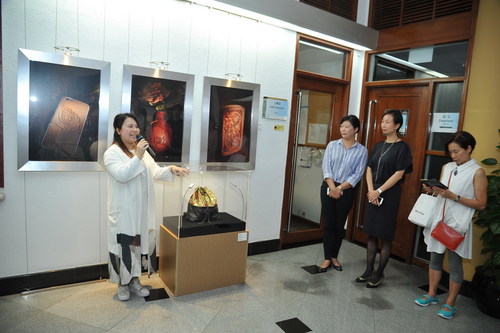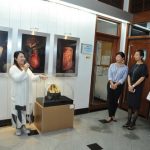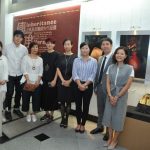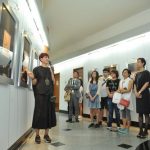 The course instructors introduced their leather pieces to the guests and attendees.
The course instructors introduced their leather pieces to the guests and attendees.
To promote the development of local cultural and creative industries and to enrich the cultural life of the residents, the Institute for Tourism Studies (IFT) hosts the “Inheritance – Exhibition of Handmade Leather Accessories and Carving Crafts by Teachers and Students” at the Team Building of IFT from 19 August to 30 October 2016, showcasing numerous pieces of handmade leather accessories and carving crafts. The public is cordially invited to appreciate the unique masterpieces of the teachers and students. Leather craft has a long history; as early as 1450 BC, ancient people engaging in leather craft and carving were already recorded on images found in the relief carvings in Egypt. During the Yellow Emperor period in China, some people used leather to make door leaf and shoes. After the world entered into the era of mechanisation, the leather handicraft industry gradually declined. Until recently, the handicraft trend has been sweeping the globe and leather craft becomes one of the favorite activities for cultural and creative artists. In response to this trend, IFT started organising a series of leather craft courses in 2013 and invited renowned leather craft designers from Hong Kong, Mr. Ryan Lau and Ms. Catherine Ling to deliver the courses of “Leather Craft – Design and Production of Handmade Practical Leather Accessories”, “Leather Craft – Design and Handmade Accessories” and “Leather Craft – Professional Design and Production of Handmade Leather Accessories”. Also in 2015, leather carving artists Ms. Sin Mei Cheong and Ms. Sin Mei I, who have studied in Hong Kong and Chinse Taiwan and taken private lessons with a Japanese leather carving teacher, joined the team to deliver the course “Design and Production of Leather Carving Crafts”. Also in 2015, leather carving artists Ms. Sin Mei Cheong and Ms. Sin Mei I, who have taken lessons in Chinese Hong Kong and Chinse Taiwan, joined the team to deliver the course “Design and Production of Leather Carving Crafts”. Leather craft emphasises on sophisticated techniques and rigorous production processes. From selection of leather and design to cutting and sewing, until the whole process is complete, every step and every detail demonstrate the proficient skills of the leather craftsmen. This exhibition showcases works of the four teachers and their students, for not only witnessing the inheritance of the handicraft spirit from teachers to students, but also demonstrating the excellent skills of leather craftsmen of the new generation of Macao. In addition to the exhibits of leather products for practical daily use, there are also exhibits of various exquisite leather carving artworks which are worth appreciating. IFT has always been committed to promoting the cultural industry in Macao. Apart from constantly providing a variety of cultural and creative courses, IFT has also pursued active cooperation with artists in recent years, organising various types of exhibitions, in an effort to promote local creation and to provide a platform for local artists to demonstrate their achievements of arts, and to integrate arts into the daily life of residents. IFT has continuously explored courses which are up-to-date, interesting and practical for the community. Currently, IFT’s Tourism and Hotel School is working with 20 international organisations, providing professional and certified courses and assessments to the public and industry professionals. Every year, the School provides hundreds of vocational and professional courses to a total of around 20,000 participants.
View gallery



